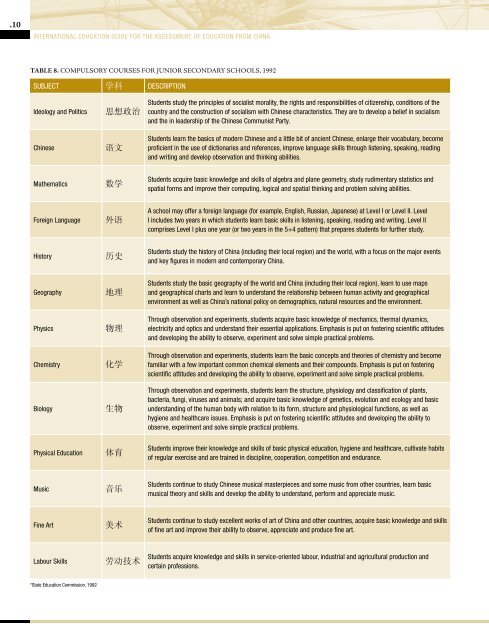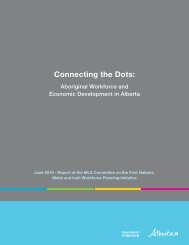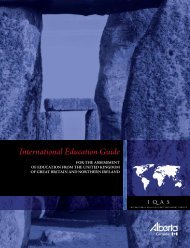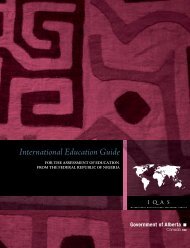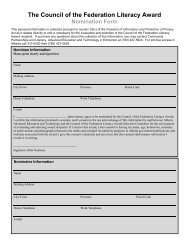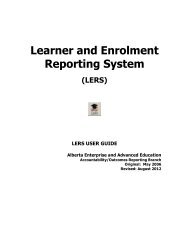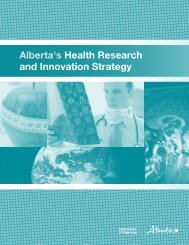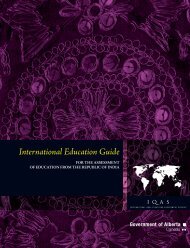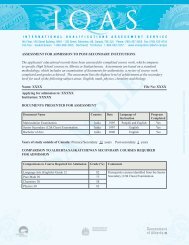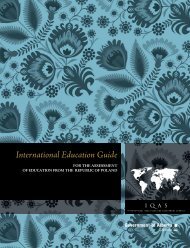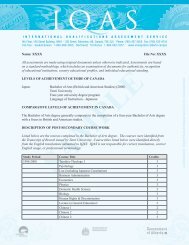International Education Guide - China - Enterprise and Advanced ...
International Education Guide - China - Enterprise and Advanced ...
International Education Guide - China - Enterprise and Advanced ...
You also want an ePaper? Increase the reach of your titles
YUMPU automatically turns print PDFs into web optimized ePapers that Google loves.
.10<br />
INTERNATIONAL EDUCATION GUIDE FOR THE ASSESSMENT OF EDUCATION FROM CHINA<br />
Table 8. Compulsory Courses for Junior Secondary Schools, 1992<br />
Subject 学 科 Description<br />
Ideology <strong>and</strong> Politics<br />
Chinese<br />
思 想 政 治<br />
语 文<br />
Students study the principles of socialist morality, the rights <strong>and</strong> responsibilities of citizenship, conditions of the<br />
country <strong>and</strong> the construction of socialism with Chinese characteristics. They are to develop a belief in socialism<br />
<strong>and</strong> the in leadership of the Chinese Communist Party.<br />
Students learn the basics of modern Chinese <strong>and</strong> a little bit of ancient Chinese, enlarge their vocabulary, become<br />
proficient in the use of dictionaries <strong>and</strong> references, improve language skills through listening, speaking, reading<br />
<strong>and</strong> writing <strong>and</strong> develop observation <strong>and</strong> thinking abilities.<br />
Mathematics<br />
数 学<br />
Students acquire basic knowledge <strong>and</strong> skills of algebra <strong>and</strong> plane geometry, study rudimentary statistics <strong>and</strong><br />
spatial forms <strong>and</strong> improve their computing, logical <strong>and</strong> spatial thinking <strong>and</strong> problem solving abilities.<br />
Foreign Language<br />
外 语<br />
A school may offer a foreign language (for example, English, Russian, Japanese) at Level I or Level II. Level<br />
I includes two years in which students learn basic skills in listening, speaking, reading <strong>and</strong> writing. Level II<br />
comprises Level I plus one year (or two years in the 5+4 pattern) that prepares students for further study.<br />
History<br />
历 史<br />
Students study the history of <strong>China</strong> (including their local region) <strong>and</strong> the world, with a focus on the major events<br />
<strong>and</strong> key figures in modern <strong>and</strong> contemporary <strong>China</strong>.<br />
Geography<br />
Physics<br />
Chemistry<br />
Biology<br />
地 理<br />
物 理<br />
化 学<br />
生 物<br />
Students study the basic geography of the world <strong>and</strong> <strong>China</strong> (including their local region), learn to use maps<br />
<strong>and</strong> geographical charts <strong>and</strong> learn to underst<strong>and</strong> the relationship between human activity <strong>and</strong> geographical<br />
environment as well as <strong>China</strong>’s national policy on demographics, natural resources <strong>and</strong> the environment.<br />
Through observation <strong>and</strong> experiments, students acquire basic knowledge of mechanics, thermal dynamics,<br />
electricity <strong>and</strong> optics <strong>and</strong> underst<strong>and</strong> their essential applications. Emphasis is put on fostering scientific attitudes<br />
<strong>and</strong> developing the ability to observe, experiment <strong>and</strong> solve simple practical problems.<br />
Through observation <strong>and</strong> experiments, students learn the basic concepts <strong>and</strong> theories of chemistry <strong>and</strong> become<br />
familiar with a few important common chemical elements <strong>and</strong> their compounds. Emphasis is put on fostering<br />
scientific attitudes <strong>and</strong> developing the ability to observe, experiment <strong>and</strong> solve simple practical problems.<br />
Through observation <strong>and</strong> experiments, students learn the structure, physiology <strong>and</strong> classification of plants,<br />
bacteria, fungi, viruses <strong>and</strong> animals; <strong>and</strong> acquire basic knowledge of genetics, evolution <strong>and</strong> ecology <strong>and</strong> basic<br />
underst<strong>and</strong>ing of the human body with relation to its form, structure <strong>and</strong> physiological functions, as well as<br />
hygiene <strong>and</strong> healthcare issues. Emphasis is put on fostering scientific attitudes <strong>and</strong> developing the ability to<br />
observe, experiment <strong>and</strong> solve simple practical problems.<br />
Physical <strong>Education</strong><br />
体 育<br />
Students improve their knowledge <strong>and</strong> skills of basic physical education, hygiene <strong>and</strong> healthcare, cultivate habits<br />
of regular exercise <strong>and</strong> are trained in discipline, cooperation, competition <strong>and</strong> endurance.<br />
Music<br />
音 乐<br />
Students continue to study Chinese musical masterpieces <strong>and</strong> some music from other countries, learn basic<br />
musical theory <strong>and</strong> skills <strong>and</strong> develop the ability to underst<strong>and</strong>, perform <strong>and</strong> appreciate music.<br />
Fine Art<br />
美 术<br />
Students continue to study excellent works of art of <strong>China</strong> <strong>and</strong> other countries, acquire basic knowledge <strong>and</strong> skills<br />
of fine art <strong>and</strong> improve their ability to observe, appreciate <strong>and</strong> produce fine art.<br />
Labour Skills<br />
劳 动 技 术<br />
Students acquire knowledge <strong>and</strong> skills in service-oriented labour, industrial <strong>and</strong> agricultural production <strong>and</strong><br />
certain professions.<br />
*State <strong>Education</strong> Commission, 1992


